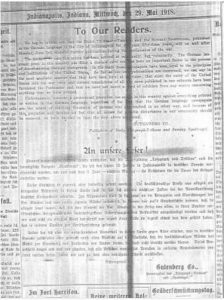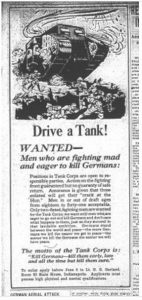Last week a co-worker and I attended the National Digital Newspaper Project Awardee Conference in DC. One of our fellow NDNP awardees from Arizona wrote about her experiences at the conference.
All posts by agriffis@library.in.gov
HOOSIER GERMAN NEWSPAPER DIGITIZATION FOR CHRONICLING AMERICA (Hoosier deutschen Zeitung Digitalisierung für Chronik Amerika)

Since the NDNP’s project beginnings, nearly seven years ago, the Library of Congress could not accept German-printed newspapers because the font type commonly used during the 19th and 20th centuries (Fraktur) represented significant challenges when conducting Optical Character Recognition (OCR). (OCR allows the end-user the ability to research digitally-created newspapers with advanced word-search engines.) Fortunately, OCR software and technology have made significant advances over the years and now allow Fraktur font-based German newspapers’ a unique opportunity for ingestion by the Library of Congress.
Seit der NDNP das Projekt Anfängen vor fast sieben Jahren, konnte die Library of Congress nicht akzeptieren deutschen gedruckten Zeitungen, weil die Schriftart häufig während des 19. und 20. Jahrhunderts (Fraktur) verwendet vertreten erheblichen Herausforderungen bei der Durchführung von Optical Character Recognition (OCR). (OCR ermöglicht dem Endbenutzer die Möglichkeit, digital erzeugte Zeitungen mit fortgeschrittenen Wort-Suchmaschinen recherchieren.) Glücklicherweise OCR Software und Technologie wurden bedeutende Fortschritte im Laufe der Jahre gemacht und erlauben nun Fraktur font-basierten deutschen Zeitungen “eine einzigartige Gelegenheit für Verschlucken von der Library of Congress.
The Indiana State Library, realizing the importance of digitally preserving Indiana German newspapers, immediately selected the Indiana Tribüne to be digitized, OCR’ed and sent to Chronicling America.
Die Indiana State Library, erkennen die Bedeutung von digital Erhaltung Indiana deutschen Zeitungen, sofort wählte die Indiana Tribune zu digitalisieren, OCR’ed und schließlich an Chronik Amerika.
“The importance of foreign language newspapers and other publications printed for ethnic groups in the US is two-fold: on the one hand, they tell us a great deal about the ethnic group itself, but, on the other hand, they tell us perhaps even more about the development of American social and cultural life in general.”
“With easier access to these documents (often ignored in research because of their inaccessibility) historians will have the ability to gain new and more accurate perspectives on life in this country. The digitization of the Indiana Tribüne will help provide those perspectives.” Giles R. Hoyt, Ph.D., Professor emeritus, Director emeritus, IUPUI Max Kade German-American Center
“Die Bedeutung der fremdsprachigen Zeitungen und andere Publikationen für ethnische Gruppen in den USA gedruckt ist zweierlei: auf der einen Seite, sie sagen uns viel über die ethnische Gruppe selbst, sondern auf der anderen Seite, sie uns zu sagen, vielleicht noch mehr über die Entwicklung des amerikanischen sozialen und kulturellen Leben im Allgemeinen. “
“Mit leichteren Zugang zu diesen Dokumenten (oft in der Forschung wegen ihrer Unzugänglichkeit ignoriert) Historiker haben die Möglichkeit, neue und genauere Perspektiven auf das Leben in diesem Land zu gewinnen. Die Digitalisierung der Indiana Tribüne wird dazu beitragen, diese Perspektiven.” Giles R . Hoyt, Ph.D., Professor emeritus, Direktor emeritus, IUPUI Max Kade German-American Center
Library of Congress Representative to Pay Special Visit to Indiana
The Indiana State Library will host a public program on Friday, July 13 featuring Ms. Deborah Thomas, the National Digital Newspaper Program (NDNP) coordinator for the Library of Congress. Ms. Thomas will discuss the Chronicling America website and the importance of digitizing and preserving historic newspapers published in Indiana. The presentation will take place at the State Library at 315 West Ohio Street, Indianapolis, in the History Reference room from 10:30 AM to noon (EDT).
Indiana is one of twenty-nine states currently participating in the NDNP program. The Indiana State Library, in partnership with the Indiana Historical Society, is digitizing a selection of Indiana’s historically significant newspapers as part of the National Endowment for the Humanities (NEH) NDNP grant. Newspapers digitized as part of this two-year project will be included in the Library of Congress’ Chronicling America website, which provides access to information about historic newspapers and select digitized newspaper pages. The NDNP is a long-term effort to develop an Internet-based, searchable database of U.S. newspapers with descriptive information and select digitization of historic pages.
This program is worth two (2) Technology Library Education Units toward public librarian certification. Please contact Indiana NDNP project manager Chris Ittenbach at cittenbach@library.in.gov or (317) 234-8153 if you are interested in attending the program. Visit either the project wiki (http://208.119.72.66/digiwiki) to monitor the Indiana NDNP project and receive real-time project status reports.
Indiana Tribüne
The Disappearance of the German Language Press In Indianapolis And Throughout the United States During 1917 and 1918
On May 3, 1918 the Täglicher Telegraph und Tribüne printed on page 1 an announcement citing an opinion of the U.S. Attorney General that the United States Government will not lend its aid to the “drive” for the suppression of newspapers printed in German, PROVIDED THAT THEY DO NOT ENGAGE IN UNLAWFUL PROPAGAGNDA”. On May 8 Täglicher Telegraph und Tribüne printed on page 1 an announcement quoting President Wilson, “I would just as leave Americanize a language as Americanize an individual. You should not regard the language in which you print your periodicals as a foreign language when printed in America for the conveyance of American thinking. Then we will have taken another step toward that combination of elements which in the long run is going to make America more various in its natural gifts, more variegated in its genius than any other country in the world.” On May 17, 1918 the Täglicher Telegraph und Tribüne printed on page 1 an announcement where Mr. George Creel (of the Committee for Public Information) opined that “…the loyal American press printed in the German language fulfills an important mission…the German papers had a right to continue so long as Congress had not abrogated that right…” Mr. Creel also opined that “…he did not favor teaching German in the primary grades of schools, but that he was not opposed to having it taught in the higher grades, as there always were some person who desired to read Goethe and Schiller in the original.” On May 23, 1918 the Täglicher Telegraph und Tribüne printed on page 1 an announcement related how Champ Clark, the Speaker of the House of Representatives, said that “…the readers of the American papers printed in the German Language need have no fear of Congress ever passing a law to suppress these papers, providing they observe the existing laws…He called the German language newspapers loyal and said that the Government itself was most benefited by them and that the Government fully appreciated the services rendered by them.”
On May 29, however, the Täglicher Telegraph und Tribüne printed on page 1 an announcement that it and the Spottvogel would cease publication on Monday June 3, 1917 after fifty three years of publication. The announcement received coverage in the English language press with a front page article in the Indianapolis Star. The Indianapolis Star article quotes Otto E. Tamm, the advertising manager of the Täglicher Telegraph und Tribüne and the Spottvogel, “We are neutral before the entrance of the United States and we have been loyal since.” In the announcement printed on the front page of the Täglicher Telegraph und Tribüne it was stated that, “Unfortunately, however, a pronounced prejudice has arisen in this country against everything printed or written in the German language, regardless of the fact that the German language newspapers are the means of reaching thousands of persons who are reached in no other way, and because of this prejudice and because we feel that all causes for possible disturbance in our community should be removed, we have decided to take the step suggested.”

One wonders about the wording “possible disturbance in our community”, were vigilante groups threatening to become active in Indianapolis? In any event, given the anti-German propaganda that the American public was completely marinated in by this time, it would seem a hopeless task for any German language paper published in the United States to stay in business. Perhaps an advertisement that appeared in the May 31, 1918 issue of the Indianapolis Star best captures the feeling of the times. The advertisement is encouraging young men who possess high physical and mental qualifications to join the army tank corps whose motto is “Kill Germans – kill them early, late and all the time but kill them sure.”

Indiana State Library Receives National Grant to Digitize Historic Indiana Newspapers
The National Endowment for the Humanities (NEH) has awarded a $293,157 grant to the Indiana State Library to digitize Indiana’s historically significant newspapers. Indiana joins 25 states participating in the National Digital Newspaper Program (NDNP), a partnership between the NEH, the Library of Congress and participating states to provide enhanced access to American newspapers published between 1836 and 1922. Newspapers digitized as part of this two-year project will be included in the Library of Congress’ Chronicling America Database (http://chroniclingamerica.loc.gov/).
“This grant is crucial to the State’s efforts to provide optimal public access to Indiana’s historical documents and cultural heritage,” said Jim Corridan, State Archivist and Associate Director of the Indiana State Library. “The State Library houses millions of copies of historic Hoosier newspapers and this initiative will enable Hoosiers instant access to these collections via the internet.”
The Indiana State Library will be assisted on the project by an advisory group of representatives from the Indiana Commission on Public Library, the Indiana Historical Bureau, Ball State University, the Hoosier Press Foundation, the Indiana Historical Society, the Indiana University School of Journalism and Indiana University Purdue University Indianapolis. The advisory group will develop criteria for inclusion of historic papers and ultimately select the newspapers to be digitized.
In addition to the Indiana papers presence in the Chronicling America Database, the digitized papers will also be available through Indiana Memory (http://www.indianamemory.org/) – a collaborative effort to provide access to the wealth of primary sources in Indiana libraries, archives, museums, and other cultural institutions. Indiana Memory’s mission is to create and maintain a digital library that enables free public access to Indiana’s unique cultural and historical heritage. Through information and pictures found in digitized books, manuscripts, photographs, newspapers, maps, and other digital materials available on the Indiana Memory website, the program seeks to enhance education and scholarship of Indiana’s past. As a portal to the collections, Indiana Memory assists individuals to locate materials relevant to their interests and to better appreciate the connections between those materials.
